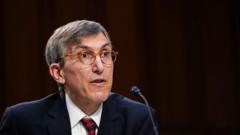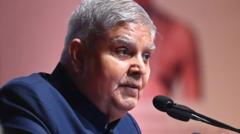Peter Marks, a prominent figure in the development of COVID-19 vaccines, has resigned from his position at the FDA following conflicts with Health and Human Services Secretary Robert F. Kennedy Jr., who is known for his controversial vaccine stance.
Top FDA Vaccine Official Resigns Amid Controversy Over Leadership

Top FDA Vaccine Official Resigns Amid Controversy Over Leadership
Peter Marks steps down from the FDA as tensions escalate under new leadership focused on vaccine skepticism.
In a dramatic shift within the U.S. Food and Drug Administration (FDA), Peter Marks, director of the Center for Biologics Evaluation and Research, has officially submitted his resignation. Reports indicate that Marks was presented with a choice to resign or face termination, leading to his departure on April 5. His resignation follows tensions with the new Secretary of Health and Human Services, Robert F. Kennedy Jr., who is widely recognized for his anti-vaccine views.
In his resignation letter, which was shared by various media outlets, Marks expressed his belief that the current administration values misinformation over scientific truth. He lamented the detrimental effect on public health confidence, particularly in light of growing measles cases in Texas, where 400 of the 523 reported infections have occurred. This alarming rise has resulted in two fatalities, prompting Marks to stress the importance of maintaining faith in established science.
The HHS responded, indicating that Marks' refusal to align with the agency’s vision of "radical transparency" under Kennedy’s leadership was a key factor in his exit. As part of a broader restructuring initiative, Kennedy has announced intentions to lay off approximately 10,000 employees within health departments, impacting the FDA and Centers for Disease Control and Prevention (CDC).
This resignation raises significant questions about the future direction of U.S. public health policy under Kennedy, whose history of promoting misinformation may challenge longstanding scientific principles in the face of continuing public health crises.




















